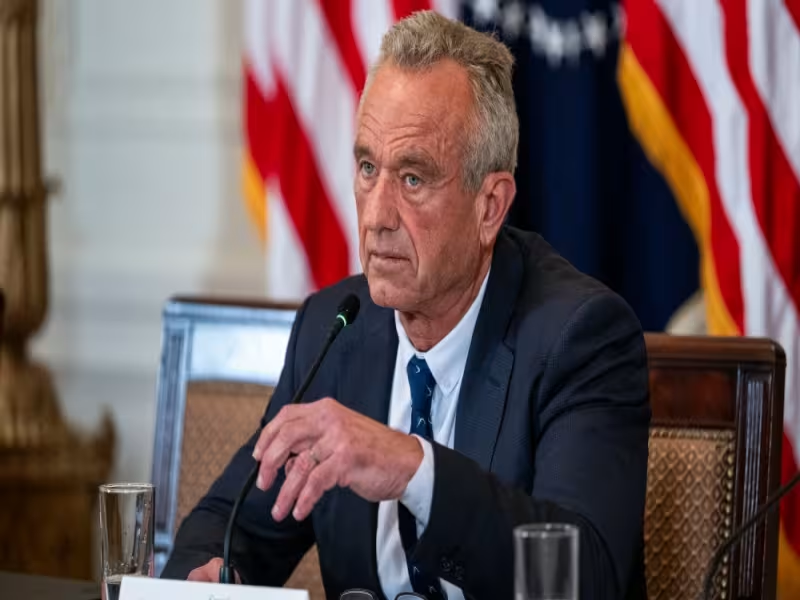
SHERIDAN, WYOMING – June 12, 2025 – Just two days after removing all 17 members of the CDC’s Advisory Committee on Immunization Practices (ACIP), Health and Human Services Secretary Robert F. Kennedy Jr. has swiftly announced their replacements—eight new members who will now guide vaccine recommendations for the nation.
The announcement, made via a post on X, marks a pivotal moment in the administration’s approach to immunization policy, drawing both strong support and sharp criticism from across the medical and public health communities.
A Downsized but Decisive Committee
Kennedy’s post on X read: “I’m now repopulating ACIP with the eight new members who will attend ACIP’s scheduled June 25 meeting,” he wrote. “All of these individuals are committed to evidence-based medicine, gold-standard science, and common sense.” He also noted the committee would “review safety and efficacy data for the current schedule.”
The new members appointed are:
- Joseph Hibbeln, a psychiatrist and nutritional scientist who was the acting chief, Section on Nutritional Neurosciences at the National Institutes of Health for 14 years
- Martin Kulldorf, an epidemiologist who previously worked at Harvard Medical School before being let go in 2024
- Retsef Levi, a professor at MIT’s Sloan School of Management focusing on supply chains and management science
- Robert Malone, a biochemist and early contributor to mRNA vaccine research in the 1980s
- Cody Meissner, a professor of pediatrics at the Geisel School of Medicine at Dartmouth
- James Pagano, an emergency medicine physician
- Vicky Pebsworth, a nurse with a doctorate in public health, and regional director of the National Association of Catholic Nurses
- Michael Ross, an obstetrician and gynecologist at George Washington University and Virginia Commonwealth University
Backgrounds Raise Eyebrows and Expectations
Many of the appointees bring prior experience with federal agencies. “Kulldorf and Meissner both have experience in advisory roles with the federal government, including previous stints with ACIP. Pebsworth has served on FDA vaccine advisory committees, and Ross served on a CDC advisory committee for breast and cervical cancer prevention.”
However, Kennedy’s critics argue the new members may tilt the panel toward his personal skepticism about vaccines. A report from William Blair stated: “We view the complete line change at the ACIP as a potential hindrance to the vaccine development space, as we think the new Committee members may have more restrictive recommendations on vaccine uptake and use.”
Leerink Partners echoed that concern: “New members will likely be sympathetic to at least some of RFK’s beliefs regarding alleged dangers of vaccines.”
Links to Kennedy’s Vaccine Criticism
The article notes: “That supposition appears to have been borne out, as Kennedy’s choices appear to reflect his anti-vaccine views. As STAT reported, Malone, Kulldorff, Pebsworth and Meissner are all named in the dedication of Kennedy’s book ‘The Real Anthony Fauci,’ which criticizes the former director of the National Institute of Allergy and Infectious Diseases.”
Notably, “Kulldorff is one of three authors of the Great Barrington Declaration, which criticized COVID lockdowns while encouraging the concept of ‘herd immunity.’ Current NIH director Jay Bhattacharya is also an author of this tome.”
“Malone, whose current occupation is unclear, conducted research on mRNA in medical applications in the 1980s but is currently an opponent of mRNA vaccine technology.”
Concerns About Appointment Process
Critics have also questioned the speed of the process. Virologist Angie Rasmussen posted on Bluesky: “The process for ACIP membership usually takes years of vetting, particularly for conflicts of interest. Have these people undergone the same level of scrutiny?” She added: “I’m pretty sure Malone has made money from saying falsely that mRNA vaccines are unsafe.”
Calls for Oversight and Investigation
Kennedy’s announcement also came just one day after a significant statement from the nation’s top medical organizations. “Kennedy’s ACIP selections come a day after the American Medical Association passed an emergency resolution urging the Senate Committee on Health, Education, Labor and Pensions to investigate Kennedy’s axing of the previous committee members.”
The resolution was co-authored by: “The American Academy of Family Physicians, American Academy of Pediatrics and American College of Obstetricians and Gynecologists.”
What Comes Next for Consumers
The first meeting of the newly formed ACIP under Kennedy’s leadership is set for June 25. Consumers and parents alike will be watching closely to understand how this restructured panel may influence future vaccine schedules, guidance, and national health messaging.
As the national dialogue continues, one thing is clear—this shift has placed vaccine policy at the center of public debate. Stay informed and review updates at www.cdc.gov.